Opinion

This present social climate presents a kairos moment for businesses pursuing social justice. In a recent New York Times interview, Apple CEO Tim Cook pointed out, “I think [business leaders] have a moral responsibility to help grow the economy, to help grow jobs, to contribute to this country and to contribute to the other countries that we do business in.” I wholeheartedly agree.

As I attempt to navigate my new normal after the traumatizing experience of standing up for love against white supremacy in Charlottesville, I am certain that empathy alone is not enough. True empathy, particularly in relation to social justice, must be followed by action. Otherwise, the cycle of marginalization, oppression, discrimination, and pain will continue.

While there are those who have embraced Swift’s new sound and video, many fans were horrified to witness “America’s sweetheart” claw herself out of her own grave. Perhaps the most startling image is the one in which Swift stands atop a mountain of past selves. It’s unnerving to watch the white T-shirt wearing “You Belong With Me” Swift lose her grip and fall with arms outstretched into the blackness.

Donald Trump’s fueling of racial fear and hate is being played out in our nation’s policies. Incredibly, Trump even justified the Arpaio pardon by saying it got high “ratings” from his constituency. He ran on a platform of anti-immigrant hostility — much like Arpaio — and his base is expecting him to deliver. And now 800,000 lives hang in the balance.

How does faith speak to the storms of life that are literal? This question comes into sharp focus as a massive tropical storm inundates a populous coastal area with endless rain and epic flooding. Before, during, and after dangerous weather events, dearly held beliefs face profound challenges.

Some of the common ground we should be able to affirm include:
Every initial of LGBTQ represents people who are beloved of God and made in the image of God.
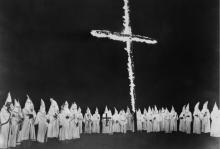
Just as the cross has inspired millions of Christians to stand up for life, to fight for freedom and to come alongside victims of oppression, there have also been times when the cross has been twisted. And a twisted cross becomes a swastika.
A symbol of love can become a weapon. The icon of redemption can become an instrument of terror.

As President Trump has pointed out, others have made bad use of that same power, favoring cronies (Scooter Libby) and benefactors (Marc Rich.) He is right about that. Both of those made my stomach turn. I was a federal prosecutor when President Clinton pardoned Marc Rich, and it was infuriating — rewarding a fugitive cut against everything I worked for. In pardoning former Maricopa County Sheriff Joe Arpaio, though, Trump has done something worse: The president has not only rewarded someone who is unrepentant, but he has celebrated the crime itself. When asked about the pardon, Trump said of Arpaio that “He’s done a great job for the people of Arizona, he’s very strong on borders, very strong on illegal immigration, he is loved in Arizona ...”

A starting point is recognizing the truth that war is never noble or courageous. Noble and courageous acts occur during war, but war itself is always the ultimate human failure and must never be portrayed as anything else. War is the expression of our worst impulses — killing and maiming one another while destroying the many good things we've built together.
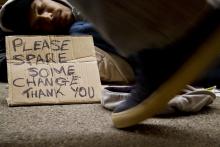
Our toxic apathy is rooted in a lot of places, but sadly we don’t have to look any further than the church itself to find several excuses to not care for the poor, vulnerable, marginalized, and downtrodden in our community and in our world.
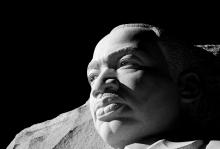
Fifty-four years ago today (Aug. 28), the Rev. Dr. Martin Luther King Jr. declared in his baritone voice, which still hangs in the air all these years later, “I have a dream.” A forgotten aspect of King’s witness was his ability to move and bring about change from the “prophetic middle.” The prophetic middle is not about being politically indecisive, indifferent, or even about being a political moderate, as King was none of those. In fact he was far more radical than the domesticated version of his life that is paraded about each January.

Take off your shoes.
No, I really mean it. Right now. Stop what you’re doing. Put down your phone, turn away from your computer screen. Loosen your laces, step out of your sandals, and free your feet from wherever they are currently confined.
Shoes off? Ok, now keep reading.
Take off your shoes, for you are standing on holy ground.

White supremacy has been a staple in much of the American and European Church. This marriage of racism to the gospel is proudly displayed on a mantle when people say America was founded on Christian principles. The so-called return to Christian values means a return to a time when white supremacy was uncontested philosophy and policy.
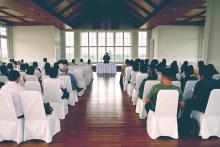
What now? Where do churches go from here? Here are five initial thoughts I would like to share, knowing the answer isn’t simple — it will take our collective discernment from the whole diversity of our churches to continue addressing our post-Charlottesville way forward.
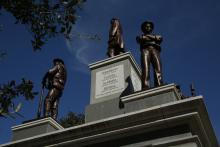
Many people who don’t study this sort of thing for a living may feel things are moving too quickly, and as such we can fall prey to common "straw man" arguments: “First Confederate statues, then what?” and “We shouldn’t erase history.”

In the wake of the Charlottesville, Va., white nationalist race riot, several writers have reached for the metaphor of addiction to help characterize the gravity of what America is facing and the grip it has on us. It's easy enough to understand why one would choose this particular comparison, especially when you take time to explore how compulsive behaviors affect the individuals engaged in them, their families and friends, and even their brains. The outcomes over time are devastating.

Has your pastor addressed the events of Charlottesville directly? Did they say that the racism and white supremacy are evil and contrary to everything that Jesus taught and lived?

I believe we’re called to be Peters in the world: Proclaiming our belief in God, and calling each other to faithful discipleship. Being supportive and loving is what we are called to do. Holding each other up and encouraging one another is part of our job as Jesus followers. Supporting the last, the least, the lost, and the left behind is our mission.

In their greed these teachers will exploit you with fake news. Their condemnation has long been hanging over them, and their destruction has long been sleeping. — 2 Peter 2:3
On Wednesday, when President Trump shut down his business advisory committees just ahead of his business advisers’ resigning en masse in the wake of Charlottesville, one of his evangelical advisers, Johnnie Moore, delivered a statement on ABC News that concluded the following.

Thousands gathered in front of the White House on Tuesday calling on the administration to protect the Deferred Action for Childhood Arrivals, the executive action signed by President Barack Obama that protected 800,000 young people from deportation. They were able to receive work permits and stay in the U.S. in exchange for providing their information and going through background checks. Now, DACA is in the hands of the Trump administration — and the program is under threat by Texas Attorney General Ken Paxton and nine other state-level officials who plan to sue if the Trump administration does not cancel DACA by Sept. 5.